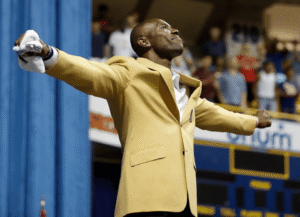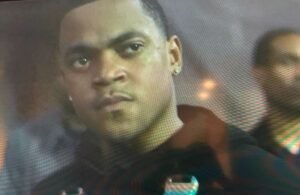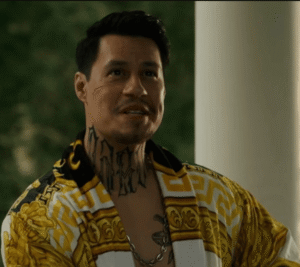Marcus Tibbs: A Steady Force Behind the Scenes in Seattle Basketball
Marcus Tibbs has built a respected career in basketball, transitioning from player to coach. As the Storm’s Director of Player Development, he plays a vital role in athlete growth.
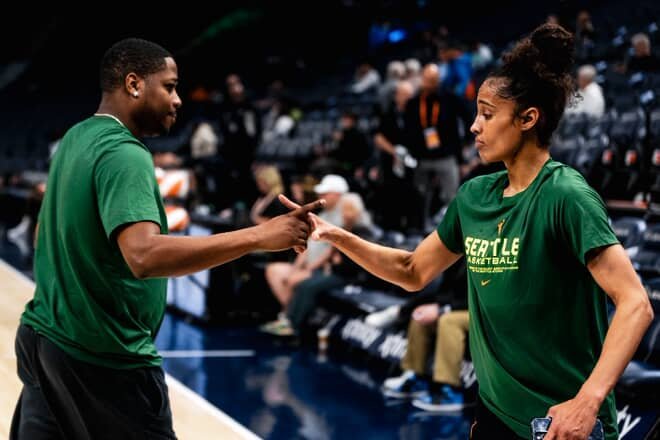
Marcus Tibbs has spent more than 10 years helping build champions with the Seattle Storm, earning respect as one of the WNBA’s most trusted development coaches. Courtesy of the Seattle Storm
Marcus Tibbs’ impact on the game, especially in Seattle, is considerable, even though he may not be the loudest voice on the court. Throughout his career, from being a talented player at Decatur High School and Bellevue College to serving as the Director of Player Development for the Seattle Storm, Tibbs’ career has been defined by consistency, care, and an unwavering commitment to the growth of others.
Tibbs has been with the Seattle Storm in various capacities since 2013 and is now a crucial member of one of the WNBA’s most respected organizations. After officially stepping into the role of Director of Player Development in April 2023, his influence has only grown more. Tibbs’ basketball story is not limited to the walls of Climate Pledge Arena.
From Player to Mentor
Tibbs had been competing before becoming a coach. He showcased his talents at Decatur High School before moving on to Bellevue College and later the University of Victoria in British Columbia. His playing career began like many other players who have a deep love for the game. Coach and player development was a natural extension of his abilities, thanks to his natural ability to connect with athletes and understand what it takes to perform at a high level.
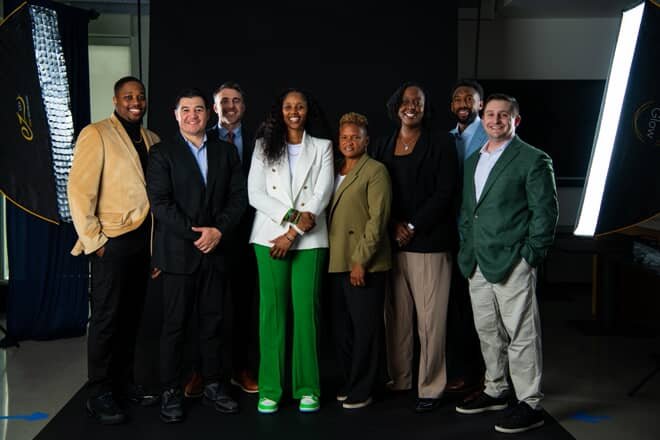
“Marcus has done an amazing job developing our players—whether it’s the veterans or the rookies,” Storm head coach Noelle Quinn recently shared with LandonBuford.com. “He has a unique ability to communicate and really focus on what our group needs.”
“Noelle Quinn is the person who gave me this opportunity, and I will always be thankful for that,” said Tibbs.
“Being a part of this coaching staff with 3 Black Women at the front is something my little girls and other people see and can be inspirational.”
Tibbs has also served as an assistant coach at Bellevue College since 2015 and the head coach of Friends of Hoop, a reputable grassroots basketball program, since 2009. Even before coaching full-time, Tibbs demonstrated his tireless work ethic in other fields, including his role as a dock worker at UPS Freight from 2011 to 2012. His basketball career has also benefited from his relentless work ethic.
The Longest-Tenured Storm Staff Member
The Seattle Storm organization has had Tibbs as their longest-tenured staff member for over a decade. He has had the opportunity to work under five different head coaches and during multiple championship-contending eras. Throughout each transition, he has maintained a consistent presence, which is a valuable asset in professional sports.
Skylar Diggins, a veteran WNBA player and newly signed Storm guard, spoke about the significance of Tibbs’ support, especially when she returned to the court after taking maternity leave.
“Marcus has been such a big help to me. Even early in the process—before I officially got to Seattle—he was one of the first people from the organization to reach out,” Diggins said. “He’s incredibly valuable to this organization. Whether it’s player development, scouting, or jumping in with the scout team, he’s involved in everything.”
Despite being unnoticed by the public, players never forget the influence of that type of behind-the-scenes influence.
A Coach Who Connects
Tibbs considers coaching to be a one-on-one relationship. The level of detail, care, and calm that he brings to players is deeply resonant. His experience in practice playing during his early years with the Storm has given him a unique understanding of both the grind and the glory of professional basketball.
“Marcus is someone who’s always been a steadying force for me,” said former Storm guard Alysha Clark. “He’s great at helping me fine-tune the little things and make quick adjustments. Even on days when I’m not feeling my best, he’s there encouraging me and keeping me grounded.”
Nneka Ogwumike, a veteran of the WNBA, highlighted her impact: “He’s a great person, and I’m very grateful that our paths have crossed in my career. You can really see the organization’s values reflected through him.”
A Summer to Remember
The WNBA has had a historic summer, with the arrival of the most hyped rookie class in league history. The ratings are up, arenas are crowded, and media attention is at an all-time high. For Tibbs, who has observed the growth of both the Storm and the league during his tenure, it’s a moment worth savoring.
He has been instrumental in guiding stars through their careers and mentoring rookies as they take their first professional steps. His influence is evident in every player he works with.
It may be best to sum it up by former Storm guard Sami Whitcomb: “He was always great for my confidence—being in my ear, encouraging me. That kind of support is incredibly helpful, especially when you have someone on staff who works with you daily, lifting you up. So yeah, I have a lot of love for Marcus.”
Rooted in Seattle, Building for the Future
Tibbs, who is a Seattle native and a self-proclaimed ‘girl dad,’ is a natural fit in the culture of the Storm. From offseason development workouts to pre-game scouting and post-practice encouragement, it’s evident that he loves both basketball and community.
“First and foremost, he’s a solid, loyal person—a true professional,” said Quinn. “He’s poured so much into our team.”
Whole Question and Answer With Seattle Storm Director of Player Development Marcus Tibbs
1. You’ve carved out a uniquely layered career in basketball—from player to youth coach to now Director of Player Development with the Seattle Storm. Looking back, what were some pivotal moments that shaped your transition from playing to coaching?
I experienced some hardships and challenges throughout my playing career. I have witnessed the value of coaches that I had in my life and wanted to be another example of them.
2. You played college ball in both the U.S. and Canada. How did those different basketball cultures influence your coaching style and approach to player development?
It was a great experience, and it helped me gain more of an understanding of players who are/were in a foreign country.
3. You’ve worked with the Seattle Storm since 2013 in various roles. What does it mean to now hold a leadership position with the same franchise you’ve grown alongside for over a decade?
It’s a BLESSING!!! Truly still wake up thankful daily because just a few years ago I was working at a high school and Bellevue college to just make ends meet. Being able to grow within your own city and with a top tier organization like the Seattle Storm is always a positive.
Coaching Philosophy & Player Development
4. You’re known for being a “pass-first” point guard during your playing days. How has that mindset translated into your approach to mentoring players, especially at the pro level?
Being able to teach the game and having played it will always give you a relationship that resonates differently with players. I understand that through my own experiences of my mentors / coaches. The mindset is always “WE not ME” because I can control the game in different ways.
5. In your role with the Storm, you’re responsible for helping some of the world’s top athletes improve their game. How do you balance technical skill development with building player confidence and trust?
I try to not “Fix” everything. Everyone is different in their mechanics. Everyone can have ball handling, balance, and reps. Those are consistent things that everyone needs daily and from there on we can enhance and add things to everyone’s daily skill development.
6. What’s the biggest misconception people have about what ‘player development’ means at the WNBA level?
The biggest misconception to me is that “I” did something. It’s the players who put in the work and apply whatever they may have learned. Additionally, we don’t have as much time to engage in the same type of off-season work as in other leagues because we don’t have many players who stay here year-round. There are a lot of workouts that I have to write out on paper and send to players while overseas / in other parts of the country.
7. You’ve been a head coach with Friends of Hoop since 2009. How has that long-term work with young athletes shaped the way you approach your role in the WNBA?
It helped me understand my way of coaching. I have been blessed to learn the game from Jim Marsh, Jeremy Eggers, and Donald Brady. As a 19-year-old still learning and playing the game from different perspectives, it helped shape my own path into the coaching world.
8. Seattle has a rich basketball culture. How have you seen the youth game evolve in the Pacific Northwest over the past decade, and what role do you hope to play in its future?
I think the advancement has simply been the youth learning the basics of the game at an even younger age. The IQ of the game is being raised and taught / learned earlier. I hope I can give back more knowledge and can inspire anyone to also coach at some point.
9. You’ve worked in both grassroots and professional basketball. What have those environments taught you about leadership—on and off the court?
Be yourself and stay true to your grind. Additionally, it has taught me that the day I think I know everything is the day I am done. I can always learn something in every situation.
10. Before coaching full-time, you even worked as a dock worker at UPS Freight. How have those early life experiences shaped the way you lead and relate to players today?
No sleep!! It helped me understand the daily work grind. I needed to go through that to understand what I really wanted to do in life.
11. What’s one goal you still have in your basketball journey—whether it’s coaching, development, or beyond the court?
WIN a RING at the professional level! I would also like to become an assistant coach someday.
12. What advice would you give to former players looking to build meaningful careers in coaching and development?
Be You! Live, learn, and grow!
13. Who were the mentors or coaches that influenced you most throughout your journey, and how do you try to pay that forward with the athletes you work with today?
Jim Marsh, Jeremy Eggers, Donald Brady and Chuck Williams. I try to reach out to everyone I encounter and connect with them as a person first and not just an athlete.
14. How do you approach building relationships with players from different backgrounds, age groups, and experience levels — especially in a league as diverse as the WNBA?
Try to learn something about them outside of the game. I am around them so much that it’s like we are family.
15. What do you think young coaches often overlook when it comes to building trust and credibility with athletes?
They try to come in and act as if they know everything and can’t be wrong. if you walk as if you know that way it can show and make players/people not gravitate towards you.
16. As the game continues to evolve, especially with analytics and positionless basketball, how have you adapted your player development methods to meet the demands of the modern game?
I feel as if I was already in a positionless mindset. The youth I coached would all learn ball handling and develop the ability to read the game from every perspective on the floor. I would also allow them to provide their own feedback in situations, so they could learn the why behind everything. I try to teach the whys in our PD work so that they can have a different level of understanding.
17. Are there specific drills, routines, or philosophies that you’ve developed or refined over the years that have become a staple in your training approach?
I think I am the PD guy who wants the player to be able to “feel” what they are doing when I am not in the room coaching them. So I don’t think I will be with them every second when they are on the court, so giving them that would be more beneficial to me.
18. In an era of highlight culture and social media, how do you help players stay grounded in the fundamentals while still embracing creativity and self-expression on the court?
I honestly tell them just to be themselves. Let that shine through, however they would like to express themselves. I am always in their corners if needed.
19. What does legacy mean to you — both personally and professionally — and how do you want to be remembered in the basketball community?
To me, legacy is something that speaks to how you were as a person and what you’ve done to leave your mark on others’ lives. I want to be remembered as a GIRL DAD, loyal, loving, caring, and real individual. I hope I have an impact on this game of giving my all to it.
20. You’ve now spent over a decade building your coaching career. What’s one thing you know now that you wish you knew when you started coaching?
I wish I knew the importance of taking care of my own wear and tear on my body. I think I would’ve played a while longer. Additionally, I wish I had studied harder when I was younger.
21. Outside of the wins and career milestones, what’s one moment in your journey that made you stop and realize you were truly making a difference?
Anytime a kid I’ve coached has contacted me, it’s a win for me, just to touch base. Seeing them with their families and own lives has been a blessing.
22. If you could design a perfect development program from youth to pro level, what would be the key pillars you’d want every player to experience and learn?
Early stages of hoops are to keep the kids interested and wanting to learn/grow.
Let the kids learn and grow through mistakes as well. Just hoop!
Basics!! Don’t cheat the game!
Watch the game! Film helps you understand things at a different level.
Play the game! If you enjoy this game try to play as long as you can and whenever you can. Outside / inside, whenever / wherever.
HAVE FUN!!!! IT IS A GAME!!!
Landon Buford is an accomplished sports and entertainment journalist based in Richardson, Texas, with over a decade of experience covering the NBA, WNBA, NFL, WWE, MLB, and the entertainment industry. Known for delivering high-impact stories and headline-making interviews, Buford has earned a global audience through content that blends insider access with compelling storytelling.
He previously served as director of editorial and brand communications at PlayersTV, where he helped shape the platform’s editorial voice and brand identity. He is also the founder and editor-in-chief of LandonBuford.com—an independent outlet with more than 1.6 million views and syndication from major platforms including Bleacher Report, Sports Illustrated and Yahoo Sports. Buford’s interviews with stars like Gary Payton, Kevin Durant, Mark Cuban and Chris Paul showcase his talent for meaningful, in-depth conversations.
His bylines have appeared in Sports Illustrated, Forbes, Heavy.com, Meta’s Bulletin and One37pm, where he has contributed exclusive interviews, breaking news and cultural insights. At Heavy.com, his work drew more than a million views in just eight months, and at One37pm, it contributed to record-breaking traffic numbers.
His work highlights the intersection of sports, fashion, music, and entrepreneurship—showcasing how athletes and entertainers use their platforms to inspire change, influence trends, and shape culture beyond the game. Landon has interviewed a wide range of figures from the NBA, NFL, and entertainment industries, consistently bringing authentic voices and untold stories to the forefront.
In addition to his journalism, Buford is an entrepreneur and content creator, dedicated to amplifying diverse narratives and driving meaningful conversations across media platforms. His passion for storytelling, culture, and innovation continues to make him a respected voice in the evolving landscape of sports and entertainment media.

